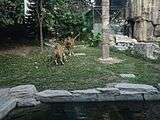Shenzhen Safari Park
Shenzhen Safari Park|

Main entrance |
| Date opened |
28 September 1993 |
|---|
| Location |
Xili, Nanshan, Shenzhen, China |
|---|
| Public transit access |
Dongwuyuan Bus Station, buses 36, 49, 66, 101, 104, M203, 226, M460, B736, B796 and B797 |
|---|
| Website |
www.szzoo.net |
|---|
Shenzhen Safari Park (Chinese: 深圳野生动物园) is a zoo in Shenzhen, China. It is located in near Xili Lake in Xili Subdistrict. and covers an area of 1.2 million square meters.[1] It is the first zoo in China to have uncaged animals.[2][3][4] There are over 300 species and more than ten thousand animals in the zoo, including endangered ones such as Giant Pandas and South China tigers.
History
The zoo first opened on September 28, 1993. Since 2004, the zoo's black swans have been engaged in a commensal relationship with the koi found in the zoo's waters.[5] The swans had originally begun dipping their food pellets into the water to moisten the texture, and as a result, the koi learned to swim up to the swans and eat the pellets.[6]
In November 2011, Chinese newspaper The Global Times reported that the park's management had sent requests to other Chinese zoos, asking for respective mates to be delivered for a ruffed lemur and a chimpanzee held in their zoo.[7]
On May 1, 2014, a lioness in the park gave birth to three cubs and neglected to care for them. Park workers had begun bottle-feeding the cubs in order to keep them nourished. A local pet store sent a Golden Retriever to care for the cubs, and the dog was accepted by the cubs as their surrogate mother on May 16.[8]
Controversy
On October 2, 2014, a horse that was pulling tourists in a heavy carriage in the zoo, for the twelfth time that day, collapsed and died.[9][10] The tourists, as well as some of the zoo's security guards, concluded that the horse's death was a result of overworking and malnourishment.[10] The incident occurred during China's Golden Week, a week wherein the prices for horse and carriage rides are increased and the horses are forced to work for longer periods of time. The zoo's management denied responsibility for the incident and claimed that the well-being of their horses is the duty of a third-party subcontractor, despite not being able to provide the supposed party's signature or name.[9]
Gallery
| A street leading into Shenzhen Safari Park. |
| The zoo's tiger enclosure. |
| A sign indicating the zoo's different areas of interest. |
| A lioness enclosure in Shenzhen Safari Park in January 2016 |
|
See also
References




